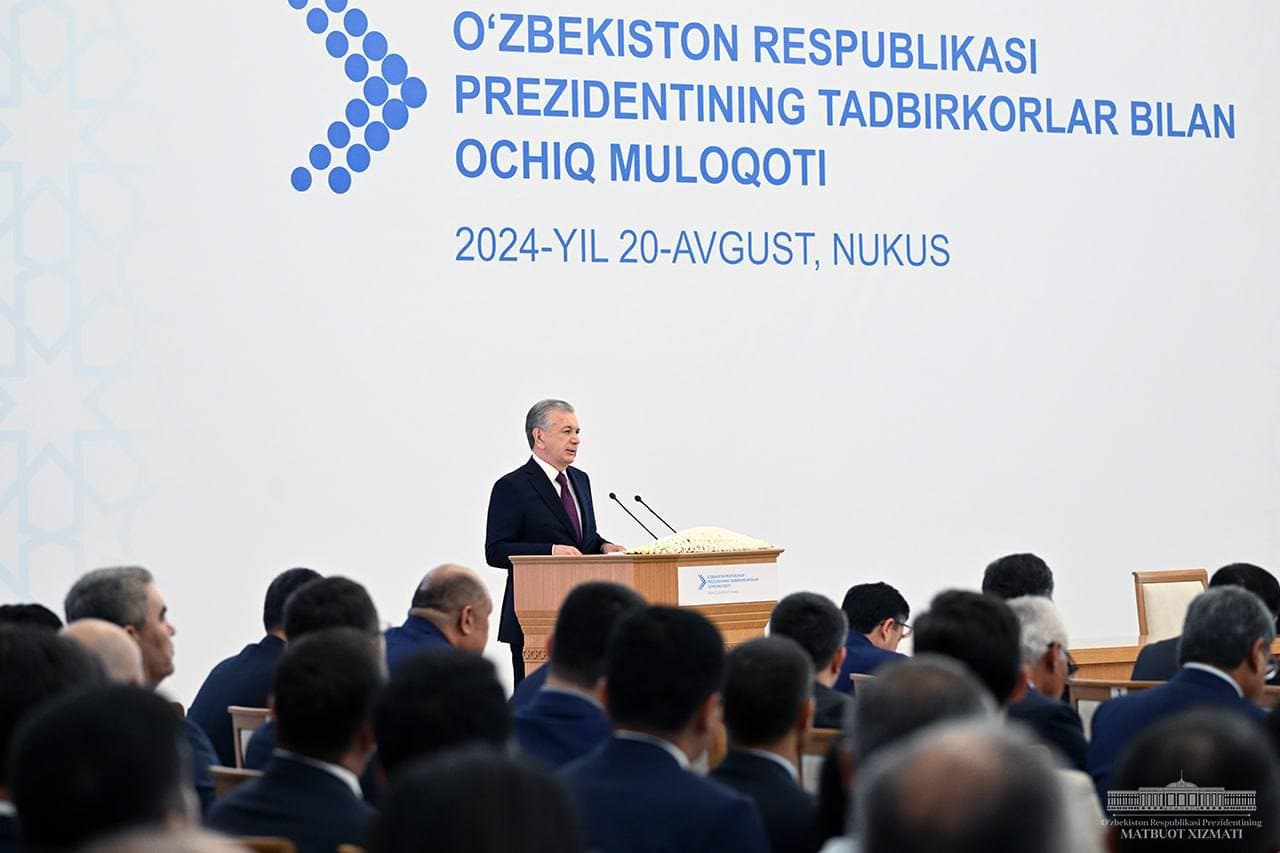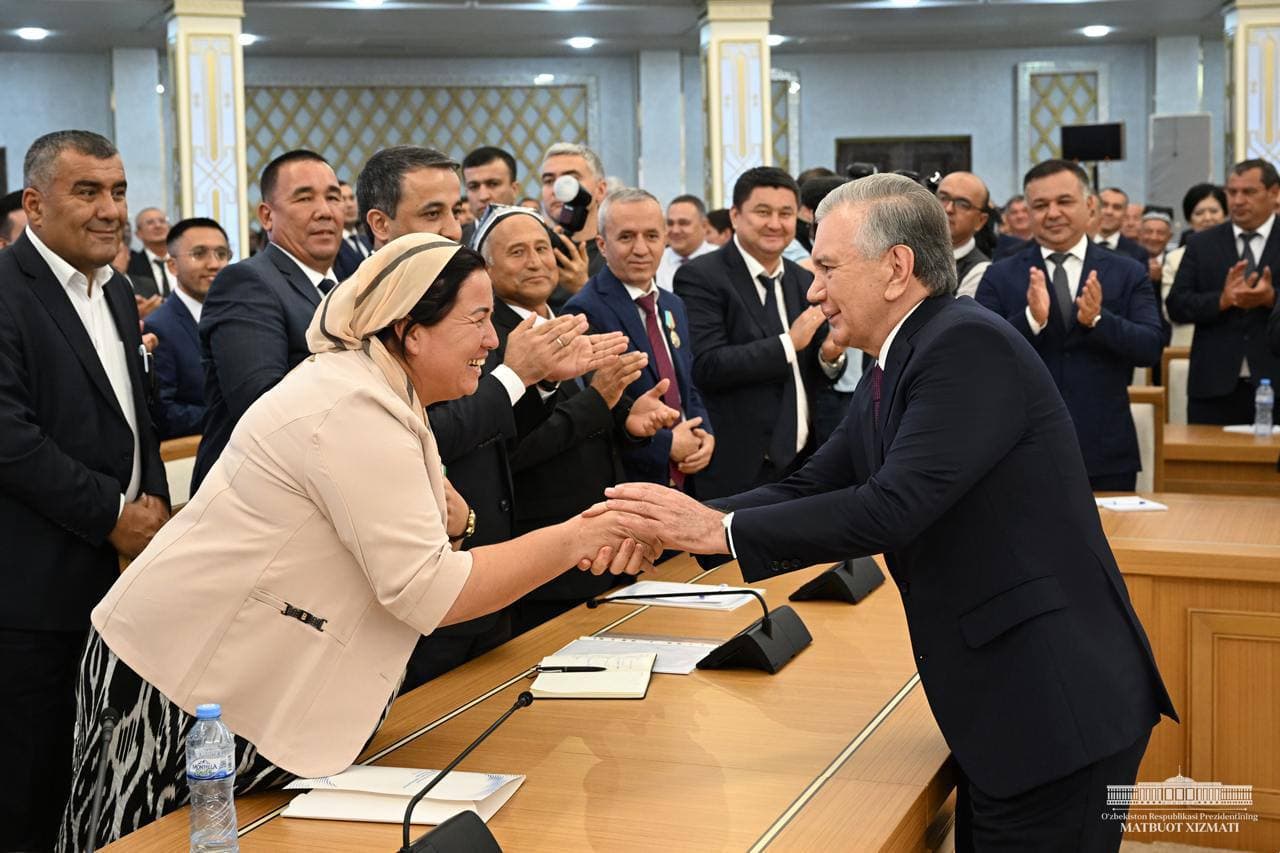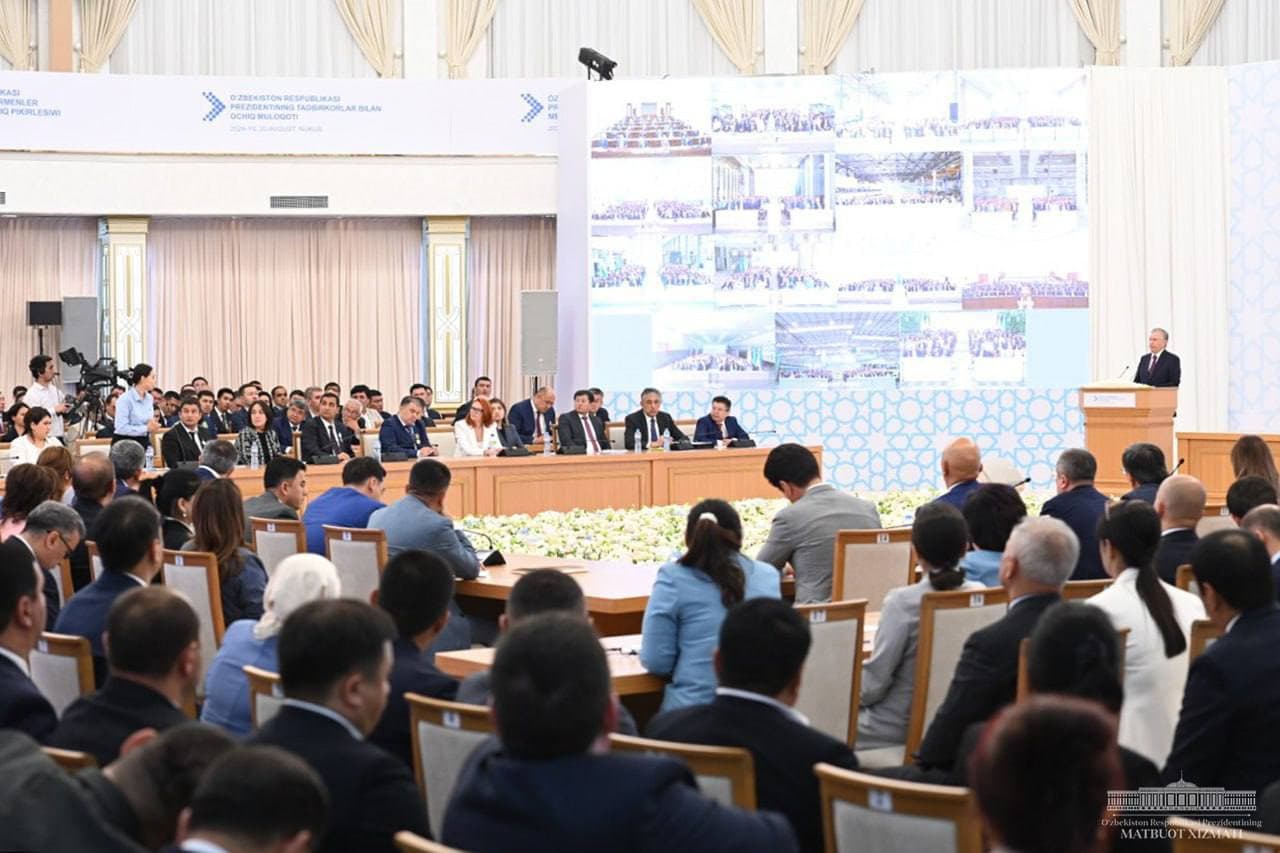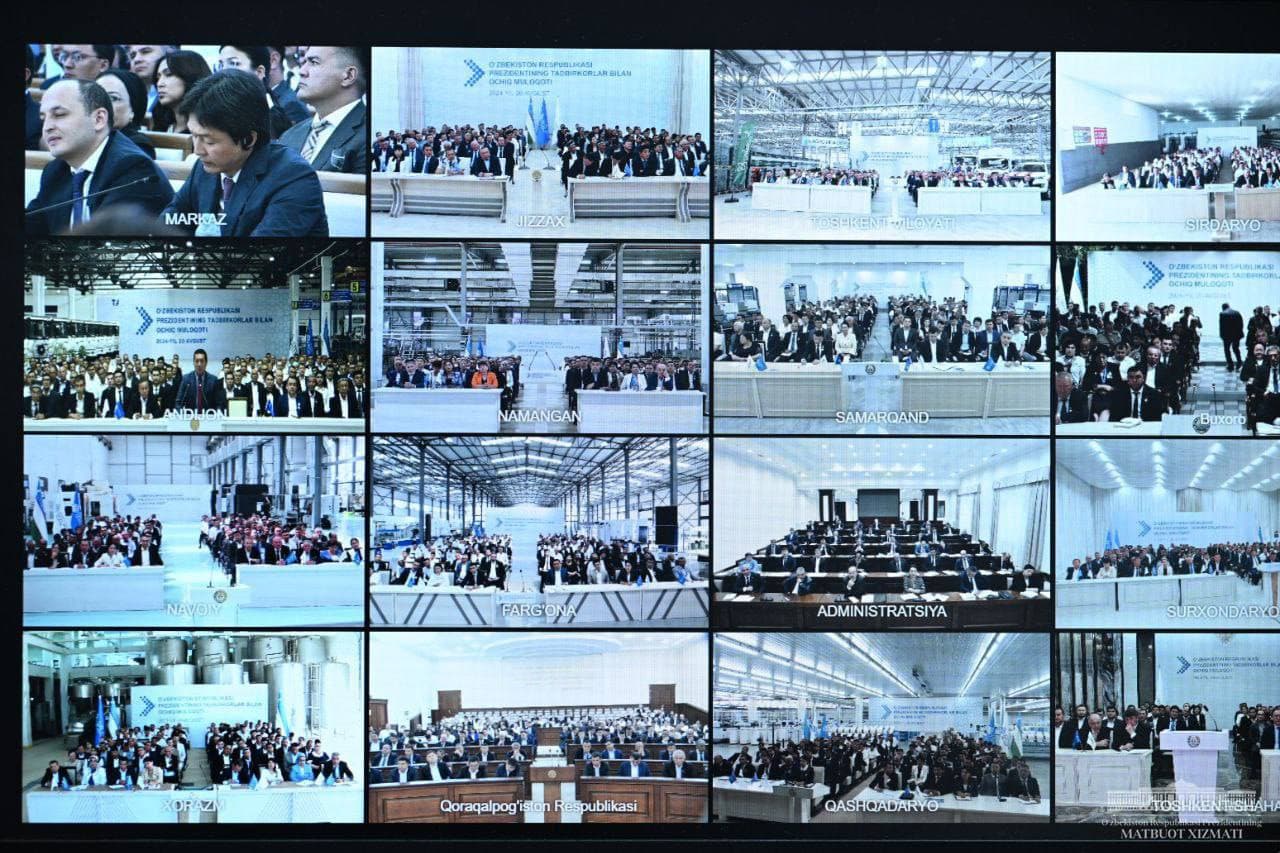Problems and business proposals discussed
2024-08-21 09:15:00 / Meetings

This dialogue, which has become traditional recently, is a long-awaited event for entrepreneurs. It is an effective platform for solving systemic problems, discussing proposals, and creating new incentives.
This time, the open dialogue continued throughout the year. The President, the Prime Minister, his deputies, ministers, hokims, the head of the Chamber of Commerce and Industry, and the Business Ombudsman constantly maintained contact with entrepreneurs.
As a result of this interaction, more than 700 issues, initiatives, and new projects put forward by entrepreneurs were supported, and an additional 8 trillion UZS were allocated. In addition, another 18 trillion UZS were allocated to develop industry, agriculture, services, and business infrastructure. The most important achievement is establishing a new support system from small projects in mahallas to megaprojects.
Previously, due to problems with loans, finding markets, infrastructure, and endless inspections, 60 percent of new entrepreneurs ceased their activities in the first year. Currently, the share of enterprises operating for more than three years is 76 percent, and for the first time, it reached 300 thousand. This also applies to 100 thousand individual entrepreneurs.
This year alone, entrepreneurs’ turnover increased by 25 percent compared to last year and reached 986 trillion UZS. The number of medium-sized enterprises with an annual turnover of 10 to 100 billion UZS doubled, and the number of large enterprises with a turnover of more than 100 billion UZS exceeded 2.2 thousand, which is twice as much as last year.
Since the tax, banking, financial, and economic complexes operate in the context of mahallas and clients, 16 thousand previously unprofitable enterprises received 6.5 trillion UZS of profit in six months.
Today, the number of enterprises with more than 100 employees has approached 3 thousand, and the number of jobs in them has increased by 440 thousand in a year. In the private sector, more than 1 million workers receive salaries of over 5 million UZS, of which 370 thousand receive over 10 million UZS. This indicates that entrepreneurs are coming out of the shadows, moving to legal activities and healthy competition.
Another example: in the entrepreneurship rating, the number of enterprises in categories “A” and “B” increased by 91 thousand, and another 170 thousand enterprises were excluded from the lowest category “D”. Thanks to this, tax audits were halved compared to last year. At the same time, during this period, the revenues of large taxpayers increased by 10 percent, regional enterprises by 25 percent, and taxes paid by district entrepreneurs by 40 percent. This results from a change in the style of tax authorities and the liberalization of doing business.
Relations with neighboring countries have reached an unprecedented level. Uzbekistan has already become a large market for both local enterprises and foreign companies and an industrial hub in the region.
The country’s gross domestic product recently exceeded $100 billion for the first time. In the first six months of this year, the volume of foreign direct investment doubled compared to last year and reached $14 billion. Such figures have not been seen in the entire 33-year history of independent development.
“All this results from reforms started eight years ago, based on mutual trust, working side by side with entrepreneurs, and constant dialogue. We still have many opportunities. Most importantly, we have patriotic and dedicated entrepreneurs like you who can implement them”, Shavkat Mirziyoyev said.
The Head of state announced new initiatives in five areas.
The first area is increasing financial resources for small and medium-sized businesses.
First, all banks and microfinance organizations will be able to participate in supporting small and medium-sized businesses from now on. Microloans will be increased threefold to 300 million UZS. At the same time, collateral for loans up to 100 million UZS will not be required.
In addition, Microcreditbank, through its microfinance organizations, will attract another 1 trillion UZS by the end of the year. Thus, it will become possible to create microfinance banks with an authorized capital of at least 50 billion UZS.
Additional opportunities will also be created for microfinance organizations: entrepreneurs can provide services in foreign currency and operate as a payment organization based on a license.
Third, in accordance with the decree of the President of Uzbekistan of August 12 this year, factoring organizations have opened up broad opportunities. Now, they will also serve clients in foreign currency. An electronic platform will be launched where entrepreneurs can choose a convenient financial product.
Thanks to the popularization of factoring, entrepreneurs will have access to 20 trillion UZS for working capital, and exporting enterprises will have access to an additional $1 billion of financial resources.
Fourth, a law on Islamic finance will be developed. This will facilitate the provision of new financial services, the influx of more investors, and the creation of additional resources worth $5 billion.
Fifth, the transfer of funds raised by the state to large enterprises will be gradually discontinued. The provision of such funds will be reduced by at least 40 percent within two years. Due to this, banks will send at least 30 trillion UZS to private businesses.
The second area provides businesses with infrastructure, land, and energy.
Two thousand requests received within the framework of the open dialogue are related to land and infrastructure. The cost of acquiring land for new investment projects has increased sharply.
Therefore, when an entrepreneur buys land at auction, value-added tax will not be charged. In Tashkent and regional centers, the acquired land can be paid for in installments of up to three years, in other regions of up to five years, and for districts of the 4th and 5th categories of up to ten years.
Second, when allocating new land, the terms from the design of buildings to the delivery of the facility will be specified.
Third, for each land plot, it will be clearly defined what types of activities can replace the primary type of activity and what auxiliary structures can be placed. For this purpose, a single classifier of land plots and capital construction projects will be introduced from January 1.
Fourth, restrictions on electricity and natural gas for industrial enterprises will be reduced. The basic tariff will remain even if the electricity and gas consumption exceeds the limit by 20 percent. If the limit is exceeded by more than 20 percent, the tariff for the exceeded portion will increase by 20 percent. Also, utility payments will not be suspended even if there is a collection.
The third direction is creating an equal competitive environment in the domestic market and expanding opportunities to enter foreign markets.
To this end, joining the World Trade Organization will continue, and competition will develop. Exclusive rights have already been abolished in the metallurgical, chemical, energy, and telecommunications industries.
In corporate procurement, the price priority for products purchased for production will be abolished. From now on, no one will have special rights, be it a state strategic enterprise, a private enterprise, or a foreign investor – everyone will work in equal economic conditions.
Second, from the funds allocated for the development of industries, $200 million will be directed to pre-export financing. Of these, $50 million will be provided as a guarantee for bank loans. At the expense of these funds, an additional $1 billion worth of products will be exported during the year.
Third, the “E-logistics” platform for cargo transportation will be launched. It will allow exporters to see which enterprise has and how many permits for transportation and conclude direct contracts.
Fourth, no debt will be formed when importing equipment and components if the contract term is not violated.
From now on, an electronic certificate from the customs authority confirming export will be the basis for the return of value-added tax, and other unnecessary documents will not be required.
Fifth, cooperation between exporting enterprises and our compatriots, who have extensive experience in doing business abroad, will be expanded.
Sixth, an increase in the share of domestic products in government procurement will be stimulated. In particular, large enterprises in the energy, oil and gas, chemical, metallurgical, and railway industries will place orders for 2-3 years on the cooperation portal. Based on these orders, local enterprises will establish the production of new types of products. Initially, $100 million will be allocated for their projects.
Seventh, the private sector will be involved in managing regional power grids. In particular, a tender will be announced in October to attract a private operator to Samarkand region’s power grid. Next year, the same work will be done in Jizzakh and Syrdarya regions.
Eighth, entrepreneurs will be offered another 300 deposits and sites with minerals by the end of the year. To cover the need for sand and gravel, 172 deposits with reserves of 110 million cubic meters will also be allocated.
The fourth direction is to give a new impetus to the service sector.
In Uzbekistan, 52 percent of the employed population works in the service sector. AI technologies will soon be widely introduced in all areas. An AI center will open in the IT Park, and $50 million will be allocated to finance projects.
Second, an ecosystem for supporting startup projects will be created. For this purpose, venture funds will be established. The state will also provide a resource of one dollar for every dollar of investment that the startup has attracted from abroad. The state will cover expenses such as patenting startup developments and registering trademarks.
Third, 3,000 specialists will be sent to localize services during the year to improve their qualifications in manufacturing companies in Germany, Japan, South Korea, China, and Türkiye. A program will be developed to expand the participation of local enterprises in servicing large enterprises.
Fourth, from January 1, part of the value-added tax for catering establishments will be returned to the entrepreneur as cashback. The profit tax of restaurants and cafes that have switched to paying such a tax will be reduced by half.
In addition, from December 1, no documents will be required when registering agricultural products purchased by these enterprises for cash. Restaurants and cafes can hire workers under short-term, simplified employment contracts.
Fifth, from October 1, the “Shaffof Qurilish” system, similar to the Entrepreneurship Rating, will be run by entrepreneurs themselves. The functions of consulting centers will be transferred entirely to the private sector.
The fifth direction is further reducing barriers and obstacles for business.
First, to eliminate barriers to entrepreneurship, a register of criteria that pose a real threat to the life and health of the population will be developed. Officials who suspend the activities of an entrepreneur based on a criterion not included in the register will be held accountable.
Second, bringing entrepreneurs to criminal liability will be even more liberalized.
Third, from now on, if a loan repayment term is violated, the current market value will be determined before the mortgaged property is put up for auction. If the outstanding debt is less than 15 percent of the value of the collateral, the collection will not be applied to the property. The bank will allow the client to pay off the debt from another source.
Fourth, the funds received from the sale of land will now be used, first of all, to pay off entrepreneurs’ debt for building demolitions.
The President noted that this year’s open dialogue is being held in Karakalpakstan and noted the advantages of doing business here. In Karakalpakstan, more than 50 benefits are provided for companies that are unavailable in any other region. A simple land allocation system has been introduced in Karakalpakstan. The region is also convenient for entering large markets.
It was noted that the “Do Business in Karakalpakstan” program will be adopted to use these opportunities effectively.
The event continued as an open dialogue. Entrepreneurs from central and regional studios and compatriots doing business abroad expressed their opinions. Problems were discussed, and proposals were supported.


